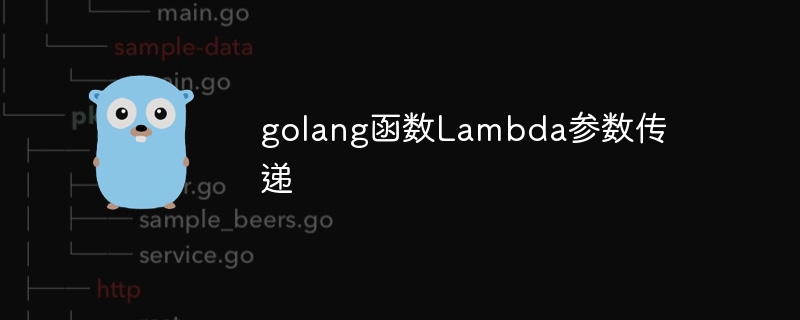
In Go language, lambda expression parameter passing uses arrow syntax (=>) to specify parameter types and return types, allowing lambda expressions to be passed as parameters to other functions. This approach simplifies the code and eliminates the need to create named functions. For example: func multiply(fn func(int) int, x int) int { return fn(x); }

Go language function Lambda parameter passing
Lambda expressions are syntactic sugar that simplifies function creation, allowing functions to be defined without creating a named function. In the Go language, Lambda expressions are defined using the func keyword, as follows:
func(x int) int { return x * x }Parameter passing
When passing a Lambda expression as When passing parameters to other functions, you need to use arrow syntax (=>) to specify the parameter type and return type. For example:
func multiply(fn func(int) int, x int) int {
return fn(x)
}In this example, the multiply function accepts two parameters: a Lambda expression fn and an integer x. The multiply function passes x as a parameter to the Lambda expression fn and returns the result.
Practical case
The following is a practical case using Lambda parameter passing:
package main
import "fmt"
func main() {
// 创建一个 Lambda 表达式来计算平方
square := func(x int) int { return x * x }
// 使用 Lambda 表达式作为参数调用 multiply 函数
result := multiply(square, 5)
// 输出结果
fmt.Println(result) // 输出: 25
}In this case, square A Lambda expression calculates the square of an integer, while the multiply function uses the square Lambda expression to calculate the square of 5.
The above is the detailed content of Golang function Lambda parameter passing. For more information, please follow other related articles on the PHP Chinese website!
 lambda expression
lambda expression
 How to define variables in golang
How to define variables in golang
 What are the data conversion methods in golang?
What are the data conversion methods in golang?
 What are the commonly used libraries in golang?
What are the commonly used libraries in golang?
 The eight most commonly used functions in excel
The eight most commonly used functions in excel
 What is the difference between golang and python
What is the difference between golang and python
 How to remove the first few elements of an array in php
How to remove the first few elements of an array in php
 What are the design patterns used by laravel?
What are the design patterns used by laravel?




